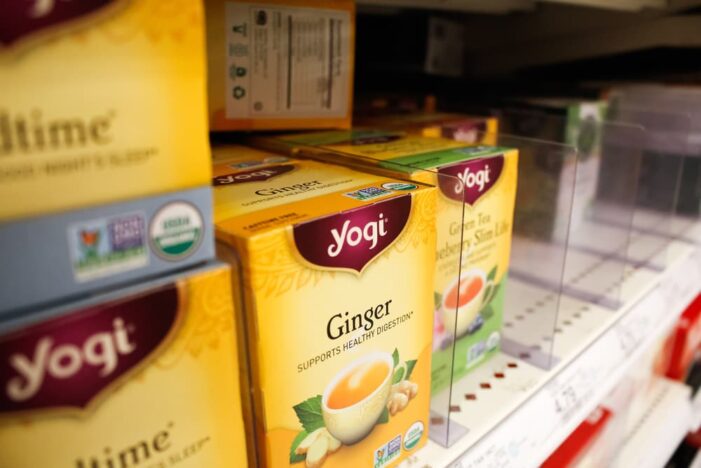Editorial credit: The Image Party / Shutterstock.com
By Korin Miller | health.com
More than 54,000 boxes of East West Tea Company tea have been recalled due to traces of pesticides detected in one of the company’s organic teas, according to a notice shared by the Food and Drug Administration (FDA).1
The company’s Organic Yogi Echinacea Immune Support tea was voluntarily recalled “because pesticide residues were detected above action levels,” the FDA said. The tea was distributed nationwide. The recall was initiated on March 12 and is ongoing.
The impacted products were sold in boxes of four or six packs, both with 16 bags per pack. In all, nearly 900,000 bags of tea are being recalled. The recalled boxes have the UPC number 0 76950 45010 3 and more than 30 different lot codes, all of which can be found below.
The recall is considered a Class III recall, which the FDA says means that it’s “a situation in which use of or exposure to a violative product is not likely to cause adverse health consequences.”2
The FDA did not reveal which pesticides were detected in the tea or at what level the pesticides were detected.
Concerns About Pesticides in Tea
Pesticides are widely used to control pests like insects, rodents, weeds, bacteria, mold, and fungus, per the Environmental Protection Agency (EPA). However, pesticides are toxic. At certain levels, they can impact the nervous system, or irritate your skin or eyes. Some are also carcinogens, meaning they can cause cancer, or may impact your hormones or endocrine system.
The FDA has a pesticide residue monitoring program that is used to make sure that chemical residues in foods don’t exceed limits and tolerances set by the EPA. (The EPA’s limits vary by pesticide.)3
The FDA states online that the agency monitors more than 4,000 food samples a year “using a multi-residue method that analyzes approximately 800 different pesticide chemical residues in a single analysis and selective residue methods that detect pesticide chemical residues not covered by the multi-residue method.”3
The best way to avoid pesticides in food is to choose organic products from popular brands. While an organic label doesn’t mean a food is completely pesticide-free, it should mean the food was grown and processed without using synthetic fertilizers or pesticides.4
It’s not clear how the pesticides got into the tea bags or how they were discovered. If you happen to have these teas at home, don’t use them. It’s not clear if the East West Tea Company will offer refunds or exchanges. A representative for the East West Tea Company did not immediately respond to Health’s request for comment.

